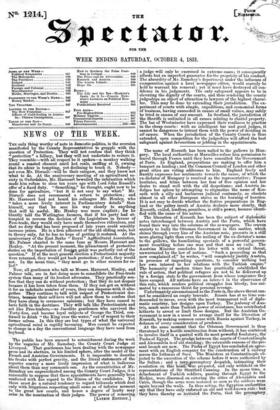NEWS OF THE WEEK.
THE only thing worthy of note in domestic politics, is the aversion manifested by the County Representatives to grapple with the question of Protection. They will not confess that they think "protection" a fallacy, but they will not undertake to restore it. They resemble--with all respect be it spoken—a monkey walking round a roasted chesnut amid hot coals, sniffing at it, owning -that its odour is tempting, yet declining to touch it. Nobody— not even Mr. Disraeli—will be their catspaw, and they know not what to do. At the anniversary meeting Of an agricultural so- ciety in Oxfordshire, Mr. Harcourt bewailed the infatuation which made him refuse to close ten years ago with Lord John Russell's offer of a fixed duty. "Something," he thought, ought now to be done for agriculture, " but it is not easy to say what." Mr. Disraeli does not recommend a return to protection; and Mr. Harcourt had not heard his colleague Mr. Henley, who " takes a more lively interest in Parliamentary details" than himself, say that he sees his way clearly to anything that will be useful. Mr. Henley was more explicit; for he bluntly told the Watlington farmers, that if his party bad at- tempted to reverse the decision of the Legislature in favour of Tree-trade, they would only have made themselves ridiculous, and that no duty that has been proposed of late years could sensibly increase prices. He is a firm adherent of the old Sliding scale, but in theory only, for he has no hope ofgetting" it restored. At the anniversary of the East Berks " Royal" Agridultural Association, Mr. Palmer chanted to the same tune as • Messrs. Harcourt and Henley. "At the present moment, the i;e%iactinent of protective *duties on the importation of forei1 grain was perfectly out of the question." If at the next genera election a Protectionist majority were returned, they would get back protection; if not, they would not. In the mean tune, " they must go to other sources for re- lief."
Now, all gentlemen who talk as Messrs. Harcourt, Henley, and Palmer talk, are in fact doing more to consolidate the Free-trade system than many of its loudest advocates. They practically con- fess that they can do without protection ; that they do not despair because it has been taken from them. If they can get on without it for an indefinite number of years, they can dispense with it alto- gether. They continue to talk with -respect of Protectionist doc- trines, because their self-love will not allow them to confess that they have dung to erroneous opinions; • but they have ceased to have faith in the doctrines. They will talk like Protectionists and act like Free-traders,—as Jacobite gentlemen who survived the' 'Forty-five, and become loyal subjects of George the Third, con- tinued to drink " the King over the water," out of respect to their former selves. In this they are but types of what the universal agricultural mind is rapidly becoming. Men cannot be expected to change in a day the conventional language they have used from boyhood.


























